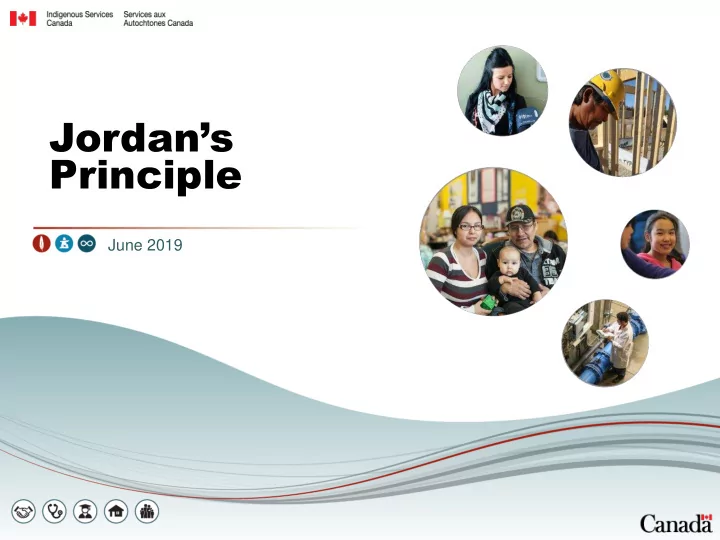

Jordan’s Principle June 2019
Purpose • To provide an overview of Jordan’s Principle including history, snapshot of current requests, and transition from First Nations Health Authority. • To discuss opportunities to collaboratively address the needs of First Nations children. 2
Jordan’s Principle • Jordan’s Principle addresses the needs of First Nations children by ensuring there are no gaps in government services to them and that they can access the products, services and supports they need, when they need them. What is Jordan’s principle? • A legal principle that applies to all First Nations children regardless of where they live (on and off reserve). • Recognizes that First Nation children may need government services that exceed the “normative standard” to ensure: substantive equality in the provision of services to the child; culturally appropriate services to the child; and/or to safeguard the best interests of the child 3
How we got here? • In 2005, Jordan River Anderson, a First Nation child from Norway House Cree Nation in Manitoba, passed away in hospital at the age of 5 before the provincial and federal governments could agree on who should pay for his home care in a medical foster home. • In December 2007, the House of Commons passed Jordan's Principle in memory of Jordan. It was a commitment that First Nations children would get the products, services and supports they need, when they need them. Payments would be worked out later. • In August 2007, Canada announced $11M in new funding for Health Canada to implement Jordan’s Principle. • In 2007, the First Nations Child and Caring Society and the Assembly of First Nations (AFN) submitted a complaint to the Canadian Human Rights Tribunal regarding Canada’s application of Jordan’s Principle. 4
Canadian Human Rights Tribunal • In 2016, the Canadian Human Rights Tribunal (CHRT) determined that our approach to services for First Nations children was discriminatory. • The Government of Canada was ordered to: – Cease its discriminatory practices; – Reform INAC’s Child and Family Services Program; – Cease applying its narrow definition of Jordan’s Principle; and – Take measures to implement the full meaning and scope of the Principle • The Tribunal has issued subsequent orders regarding how Jordan’s Principle should be defined and implemented. 5
CHRT Ruling - May 26, 2017 (amended November 2, 2017) • The Tribunal provided a definition for Jordan’s principle : - Jordan’s Principle applies equally to all First Nations children - Jordan’s Principle applies to all government services - Where the service meets the normative standard, the government department of first contact pays for the service without case conferencing or other administrative steps - Where the service beyond the normative standard, the government department of first contact will evaluate the child’s individual needs to determine if the service should be provided to ensure substantive equality, be culturally appropriate or in the best interest of the child. • The Tribunal also found: - Canada could undertake clinical case conferencing with professionals, family members, and/or the community where further information is reasonably necessary to understand the First Nations child’s clinical needs. - Canada must respond within the following time frames: - Urgent cases involving irremediable harm: Immediately - Individual requests within 12 hrs (urgent) to 48 hrs (non-urgent) and for group requests within 48 hrs (urgent) to 7 days (non-urgent) once Canada has all the information required to do so 6
Jordan’s Principle On July 5, 2016, Canada announced up to $382.5 million over three-years (2016/17 – 18/19) for: • Service coordination : fund external organizations to provider service coordination; • Service Access Resolution Fund (SARF) : fund to address the identified unmet health, social and/or educational needs; • Data collection : collect and analyze service and financial data; • Capacity: Adequate human resource capacity to implement Initiative; and • Engagement with First Nations. Governance • To encourage increased dialogue and timely advice on Jordan’s Principle implementation and planning activities the Jordan’s Principle Oversight Committee was established. All CHRT Parties are represented (Caring Society, AFN, Nishnawbe Aski Nation (NAN), Chiefs of Ontario (COO). 24-hour Jordan’s Principle reporting line: 1-855-JP-CHILD 7
Jordan’s Principle Requests • Nationally from July 2016 to April 30, 2018, more than 227,000 requests were approved under Jordan's Principle. • In BC, from March 2018 to May 2019, we approved approximately 3,372 requests totaling about $30.5 million • These included speech therapy, educational supports, medical equipment, and mental health services. 8
J ordan’s Principle Transition in BC • As the legal obligation for Jordan's Principle rests with Canada, Canada and the First Nation Health Authority (FNHA) mutually agreed to transition the evaluation and determination of all Jordan's Principle requests to Indigenous Services Canada (ISC) BC Region in February 2019. • There was no change in navigation pathways, as FNHA continues its navigation functions through the FNHA Child and Youth Systems Navigators who remain in place and continue to work with families and caregivers of First Nations children to access services and supports in a timely manner. • Families and caregivers of First Nation children can be served by calling ISC BC Regional Office or FNHA who will work together in the background to make sure that requests are processed within identified Canadian Human Rights Tribunal timelines. They can also call the Jordan's Principle toll-free phone line at 1-855-572-4453 (open 24 hours a day, 7 days a week). 9
Recommend
More recommend